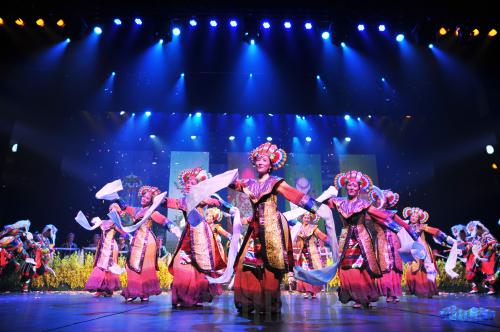|
 |
|
SNAZZY SLEEVES: Tibetan women dance during a rehearsal for The Golden Home in Beijing on June 28 (WEI YAO) |
Surrounded by an air of mystery, three performers wearing blue masks entered the stage in the opening scene of a Tibetan opera. They recited a legend of a Tibetan figure from a distant age, in a familiar motif of the art form. With holy and customary fashion, the performers showed their respect for Thangtong Gyalpo (1385-1464), the founder of traditional Tibetan opera, who is regarded as the incarnation of wisdom and strength by Tibetan people.
On the evening of July 1, performers from the Tibetan Opera Troupe, based in Lhasa, capital of Tibet Autonomous Region, staged a debut of a new Tibetan play The Golden Home at the National Theater of China in Beijing.
The opera troupe traveled to the nation's capital to attend the 4th National Ethnic Minorities Art Festival, held between June 7 and July 6. The art festival is attended by 41 troupes across the country, with each troupe presenting one play or opera representative of the uniqueness of a minority culture, according to Tondrub Wangben, Vice Minister of the State Ethnic Affairs Commission of China.
"Two features make the Tibetan play unique to the Beijing audience," Ta Tsering Dondrup, head of the troupe, told Beijing Review, "First, the plot is based on a real story rather than a fiction; second, we use modern music and dance to enrich our performance rather than limiting it to traditional ways. We hope the Beijing audience could appreciate our ancient stage art and have more understanding of Tibetan culture," he said.
Many in the festival audience were seeing Tibetan opera for the first time. After the premiere of The Golden Home, audience members expressed their views of the play. A Canadian living in Beijing named Andrew said he was very interested in Tibet and he was excited to watch the Tibetan opera in Beijing. Andrew said, "Their performance combines tradition and innovation."
Reflecting realities
Unlike other traditional Tibetan opera, which are usually based on religion or myth, The Golden Home depicts a real-life story about common Tibetan farmers' efforts to improve their lives, giving audiences a glimpse of the average Tibetan's situation.
In the play, lead character Tondrub Tashi returns to his rural hometown after graduating from university. He plans to build a canal in a nearby mountain to help develop farming land for villagers. Despite his good will, the plan is denied by some villagers who believe the mountain is protected by a god who will punish them if they attempt to change the landscape.
"The story depicts the conflict between scientific thinking and outmoded superstitions, showing how modern Tibetan people free their minds from ignorance," said Phurjung, the screenwriter of the play.
"The play is based on a true story," Phurjung said. "I traveled to Luntse Prefecture in the southern area of Tibet in the summer of 2010, where I found that the local villagers led a comfortable life by planting newly bred crops thanks to the canal which they built to funnel water from mountains to irrigate farmlands."
"When I returned to Lhasa, I decided to write a play based on what I saw during the visit," he said. "It took more than a year for the play to premiere in Lhasa in 2011."
Traditionally, Tibetans dare not reshape their lands, such as mountains, lakes and rivers, due to ancient beliefs that all of nature should remain intact, even as the villagers suffered from infertile farmlands which lack irrigation, Phurjung explained.
However, "the younger Tibetan generations are no longer bound by old thoughts. They want to improve their lives by employing the knowledge and technology that they learn at schools and universities," Phurjung said. "The change of minds is what I hope to show through the play."
In the ending, Tashi successfully persuades his fellow villagers to build a canal to irrigate the lands and improve the life of the community.
Another theme focuses on the many Tibetan university graduates who return to their hometowns to improve local livelihood.
"In recent years, both the central and local governments have issued a series of favorable policies encouraging graduates to bring their knowledge and skills home for the benefit of local people," Phurjung said.
| 